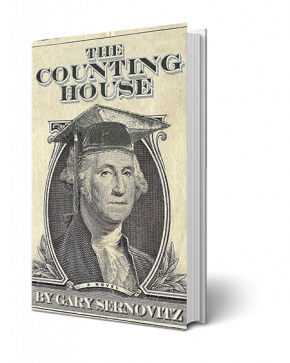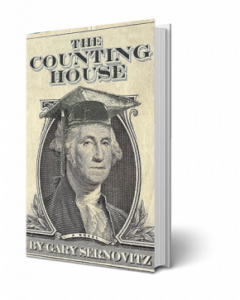My favorite finance novel of the past few years was released today, November 14, 2023.
The central character of The Counting House, identified throughout the novel as “the CIO,” is in a mid-to-late personal and career crisis, as the manager of a University endowment.
Once upon a time, the Chief Investment Officer managed to beat the market for a few years. In addition to securing his comfortable pay package he got a hagiographic New York Times write-up as his reward. Unhappily ever after, however, he has languished in financial-performance mediocrity. Lately he has underperformed. That is his perseverative fear.
I met The Counting House author Gary Sernovitz in person a few years ago when he visited San Antonio to make a presentation on the oil and gas industry. In his day job he is a managing director of Houston-based private equity firm Lime Rock Partners. I read an advance copy of The Counting House this past summer.
Was This Written Just For Me?
While I recommend The Counting House to anyone interested in the overlapping themes of a finance guy’s mid-life crisis and competing philosophies of investment management, I have one big fear about this novel: Was this written specifically for me? In the most micro-niche targeted way? Like, possibly I might enjoy and relate to this book more than anyone else on the planet.
First, there’s the level of specificity of the years 2000 to 2023-era hedge fund, private equity, quant fund, and asset allocation characters. Sernovitz name-drops everybody who was anybody during this period. We meet, as the CIO meets, representatives of practically every institutional investment strategy of the past 25 years. Via the CIO’s jaundiced viewpoint, we get Sernovitz’s most skeptical view of each of these. Which are all skeptical views very much worth reading because they are funny, insightful, and multi-layered.
Although an asset manager himself, the CIO stands at a critical distance from these giants of investment management. He doubts everything about their strategies. He allows for the possibility of genius but assumes that luck and timing play a greater role than genius in raising their reputations.
The central question of the CIO’s inner monologue – to what do we attribute above-market returns? – is the defining finance debate of our times. The protagonist is an asset allocator – he picks the managers who implement the strategies – but he’s deeply skeptical of even that role. Is he exercising a skill? What is that skill, exactly? For people like me, who find markets exciting – yet who have read the research on efficient markets and find most investing strategies absurd – this debate is everything. Everything!
In this particular way the philosophical market question underlying The Counting House seems micro-targeted to me. People who love the markets, but also understand that most of what we humans do to “invest” is a kind of hocus pocus that mesmerizes and entertains but ultimately offers worse risk-adjusted returns than do pure stock index funds.
Are there a few tens of thousands of people who are similarly obsessed with this question? I hope so, which would give this novel the broad audience it deserves.
The protagonist’s fear, of underperforming or actually losing money, further makes this book particularly appealing to me.
It is difficult to explain to people who haven’t been fiduciaries for other people’s money, just why this is particularly torturous. From the outside, it probably looks like a highly “First World” problem: When you lose money for wealthy people, institutions and for yourself well, “Boo hoo. So sad.” But, like, did anybody die? No.
The CIO is tortured. I have been similarly tortured.
You feel like a failure. You question whether you have any skill at all. Was past success just an illusion? Were your assumptions made about skill mere self-deception? Investors are not generally naive. Being naive or self-deceived is the worst character flaw for an investor to admit it to. Was I unlucky, did I have bad timing, or was I the dumb money in the situation? Is attempting to achieve risk-adjusted returns, better than an index fund, ultimately a fool’s game?
Certainly I have concluded (in good company with my main man Warren Buffett) that the vast majority of people – and institutions – shouldn’t be trying to beat the market. They do not have an edge. That’s always my advice, now that I’m on the merely-advice-giving side of things, rather than the fiduciary side.
The CIO and his Oz
The novel builds to the CIO’s meeting with an Oz-like character. A billionaire wizard of the markets, who does have an edge. He consistently wins. And he prefers to interact with nobody.
He has a lizard-like personality, devoid of warmth. Just pure market-genius. His energy derives from the screens of his Bloomberg terminal. He has no time for human interactions. He is in Sernovitz’s depiction a horror in a human shape, practically oozing a sulfurous smell. Devoid of every human weakness or human vulnerability. He cares nothing for the uses of money – either consumption or philanthropy. He is a pure market creature.
I appreciate Sernovitz’s thought experiment. What lies at the very center of everything? What is the purest expression of capitalism? Sernovitz is a capitalist. I know this not only from his day job but from his earlier book which celebrates the fracking revolution, called The Complete Story of the Shale Revolution, The Fight Over Fracking, and the Energy Revolution, which I also highly recommend.
He also clearly enjoys these contradictions. Can you be an investor but acknowledge the absurdity of it all? Can you be a capitalist but acknowledge an inhumane lizard-brain as the clearest expression of the philosophy? Can you find something worthy of a lifetime’s effort, but constantly critique it?
These are questions possibly better addressed through fiction than philosophy.
A version of this book review ran in the San Antonio Express News and Houston Chronicle.
See related post:
Book Review: The Green and The Black by Gary Sernovitz
Post read (549) times.







